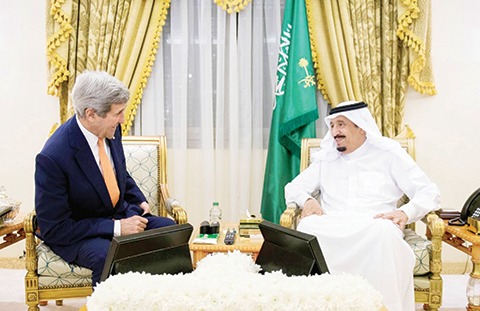By B Izzak & Agencies
KUWAIT: HH Sheikh Mishal Al-Ahmad Al-Jaber Al-Sabah took the constitutional oath at a special National Assembly session on Wednesday, becoming the 17th Amir of the State of Kuwait. HH Sheikh Mishal read: “I swear by Almighty Allah to respect the constitution and the laws of the state, to defend the liberties, interests and properties of the people and to safeguard the independence and territorial integrity of the country,” as stated in article 60 of the constitution.
In a speech after the constitutional ceremony in the Assembly, Sheikh Mishal paid tribute to late Amir Sheikh Nawaf Al-Ahmad Al-Jaber Al-Sabah and strongly criticized the government and the Assembly for taking “unanimous decisions that harm national interests”.
The first decision HH Sheikh Mishal took after assuming his constitutional powers was accepting the resignation of HH the Prime Minister Sheikh Ahmad Al-Nawaf Al-Sabah, who submitted his government’s resignation to HH the Amir at Seif Palace. The Amir then asked HH Sheikh Ahmad to remain as a caretaker premier until a prime minister is appointed.
HH the Amir Sheikh Mishal pledged to be a “loyal citizen” for his nation and people and underlined that executive and legislative authorities should cooperate to serve the best interests of Kuwait. “Today I have become head of the state and I pledge to the Kuwaiti people through you to be a loyal citizen for his nation and people, keen on the interest of the nation, keen on national unity,” as well as development, progress and prosperity, HH the Amir said in the speech before the parliament after taking the oath. “The task is heavy and the oath is great,” he noted.
HH the Amir said he is keen on compliance with the constitution and application of the law on all and fighting corruption. He also asserted “our commitment to our Gulf and international” obligations. HH the Amir said executive and legislative authorities have obligations to meet for the nation and citizens, and not take decisions that would be harmful to the nation, citing unfair appointments, naturalizations that “change Kuwait’s identity”, the amnesty file “and its consequences” and the rehabilitation file that were “harmful to our nation, and an evidence of the harm to the interests of the nation”.
“What is sadder is the silence of the two authorities over this systematic harm which legitimizes them (files), and the matter becomes like a deal of mutual interest and benefits for the two authorities at the expense of the nation,” HH the Amir underlined. “Therefore, we issued a decision to stop the appointments and transfer (of people) between jobs, and the rest of the files will be addressed to serve interest of the nation,” he said. “We have warned in the past of threats against our nation, and we need to stick to our national unity and security,” and work on improving the economy and living conditions of people.
HH the Amir urged them to consult and work together and to spread optimism with the objective of preserving national identity for the sake of the nation. HH the Amir said the political leadership would be close to all parties and follow domestic development closely, urging objective questioning by parliament members within the framework of the constitution and law.
HH the Amir paid tribute to the late Amir Sheikh Nawaf, who contributed to the development and prosperity of Kuwait. The late Amir, he said, was an example of humility and forgiveness. HH the Amir thanked citizens, expatriates, leaders of friendly countries and even those who could not come to Kuwait for expressing their condolences. “To all of them I say: Thank you for your sentiments for sharing our grief,” he said.
As Crown Prince, HH Sheikh Mishal had been delegated extensive constitutional powers of the Amir due to Sheikh Nawaf’s illness. He used those powers only last week to prevent the government from appointing civil servants for three months, citing irregularities and violations in the appointments. Under the law, the Amir can reappoint the prime minister to form a new government or can appoint a new prime minister. The National Assembly sessions will be suspended until the new government is appointed. Accordingly, amendments to the residency law will also be delayed.










